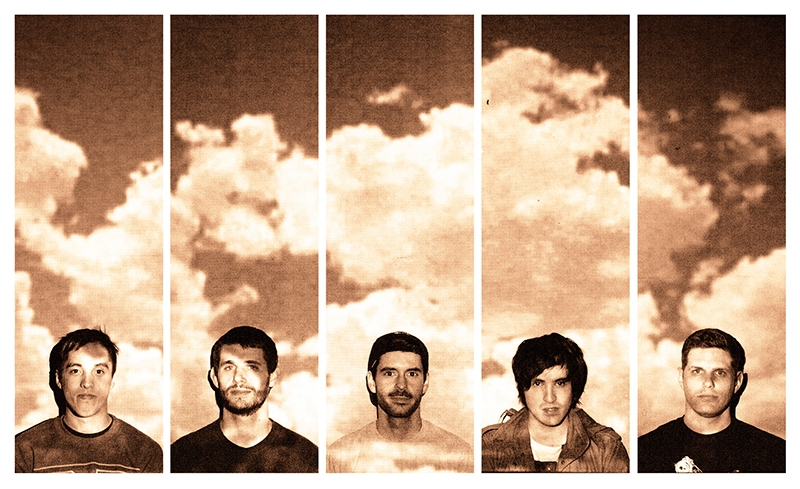Head Room: Comadre Unleashes Comadre
Music Interviews
“We write until we feel like we don’t have good ideas anymore,”says Jack Shirley, guitarist of the Bay Area punk band, Comadre. For a band that has put out three previous, full-length albums, splits with Trainwreck and Glasses, five mixtapes, an EP and a self-titled record out Jan. 8 on Vitriol Records, it’s clear that they are nowhere near a drought of creativity. What’s more is that Comadre have underpinned their existence with a tenure of DIY ethics, having self-released all of their releases up until this one on bassist—and Jack’s brother—Steven Shirley’s label, Bloodtown Records. Considering all of vocalist Juan Gabe’s passionate screams throughout the years, the aural textures of Comadre certainly demonstrate that the album’s namesake is still “interested in a raw kind of emotional approach to making music,” as Jack puts it.
Having released music in some form or another every year since their inception in 2004 up until about this time in 2011, Comadre wrote their upcoming album with a more calculated approach to song dynamics, which has taken nearly two years to accomplish. “There definitely was a conscious effort to change it up a bit in terms of not being so guitar-heavy and start to sub out some guitars,” says Jack. Indeed, one may notice the addition of keys on the track “King Worm” or trumpet on “Drag Blood” in places where guitar lines would have normally been in Comadre’s previous oeuvre. Jack attributes their instrumental decision-making to a desire to change things up “texturally.” Jack says, “I’m a big Tom Waits fan, and I listen to so much of that music—I thought it would be cool to make a punk rock record that had a little bit more of that organic, old-school [feel].” The band also afforded themselves these instrumental moves largely in part by not recording Wes Elsbree’s drumming with any type of cymbal strike besides that of a hi-hat in the large, open space of Jack’s neighbor’s antique restoration business; Jack, (who has recorded all of Comadre’s albums), added in cymbals to the cuts retroactively, in a purely accentual way. Thus, Comadre has avoided any “loud wash of cymbals” and superfluous guitar, freeing up sonic volume and space, which has allowed the other instrumental parts to shape the energy of each song on the album. “It’s head room that’s left by not having everything completely full all the time,” says Jack. “If everything’s loud, then nothing’s loud.” The band additionally took the helm of a foreign song-arrangement style wherein their new songs repeat parts—for the first time in their recording history—a more “classic” style of songwriting in “an effort to keep things a lot more straightforward and less spastic and stream-of-consciousness,” says Jack. “Summercide,” for example, exhibits garage-like riffs on the keys. The second time that riff comes around, the accompanying guitar mutates into a bending lead that bolsters the second round of the chorus with Juan screaming lyrics that read, “It was the summer suicide. [T]he sun was sinking into our moonlight.”
Although Comadre are transferring from Bloodtown to Vitriol, their DIY spirit still rings true. “Vitriol is run by a super close friend of ours, Justin [Smith], who we’ve been involved with in some capacity since we’ve been a band,” Jack says. Smith has played alongside Comadre in his bands Graf Orlock, Ghostlimb and Dangers, which earned Vitriol Comadre’s partnership amid various label offers over the years. Jack affirms that the band would not have signed on had the label not belonged to a close friend. Still, Comadre is handling the bulk of their creative outlet with Jack recording, Steven handling finances, Juan creating artwork, his brother, guitarist Kenny Gabe, booking and organizing tours and promoting online, and Elsbree helping out wherever he can. Smith tops it off with a wider PR network, reaching more people than Comadre have previously. Jack says, “The thing that Justin was excited about was that we’re doing it all by ourselves.”
After about 10 months of not playing shows or even their preexisting set, Comadre look to integrate their new songs into their live set, but without the accompanying instrumentation. “The whole idea with this thing was to make a studio album and have it be just that,” says Jack. “It’s not like we’re going to show up with a bunch of keyboards and an accordion and all that stuff.” Unfortunately, not all the songs will work in a live set, but Comadre’s vast catalog and live energy will surely shine through nonetheless to make for killer shows. As a band that has traveled to Malaysia and had monkeys steal food out of their hands while on tour, Comadre’s own hunger for playing abroad has surely grown after nearly a year of starvation. Jack reminisces on the strong community that Salt Lake/Utah County has shown the band, who aim to return sometime around June. Though Juan and Steven’s touring schedules now have to work around their teaching day jobs and Jack’s recording studio is as busy as ever, the dual sets of brothers and longtime friend Elsbree are committed to the band just as much as they are to each other. Jack says, “We all are totally stuck with each other because without one of the five people, the band just doesn’t exist anymore.”
